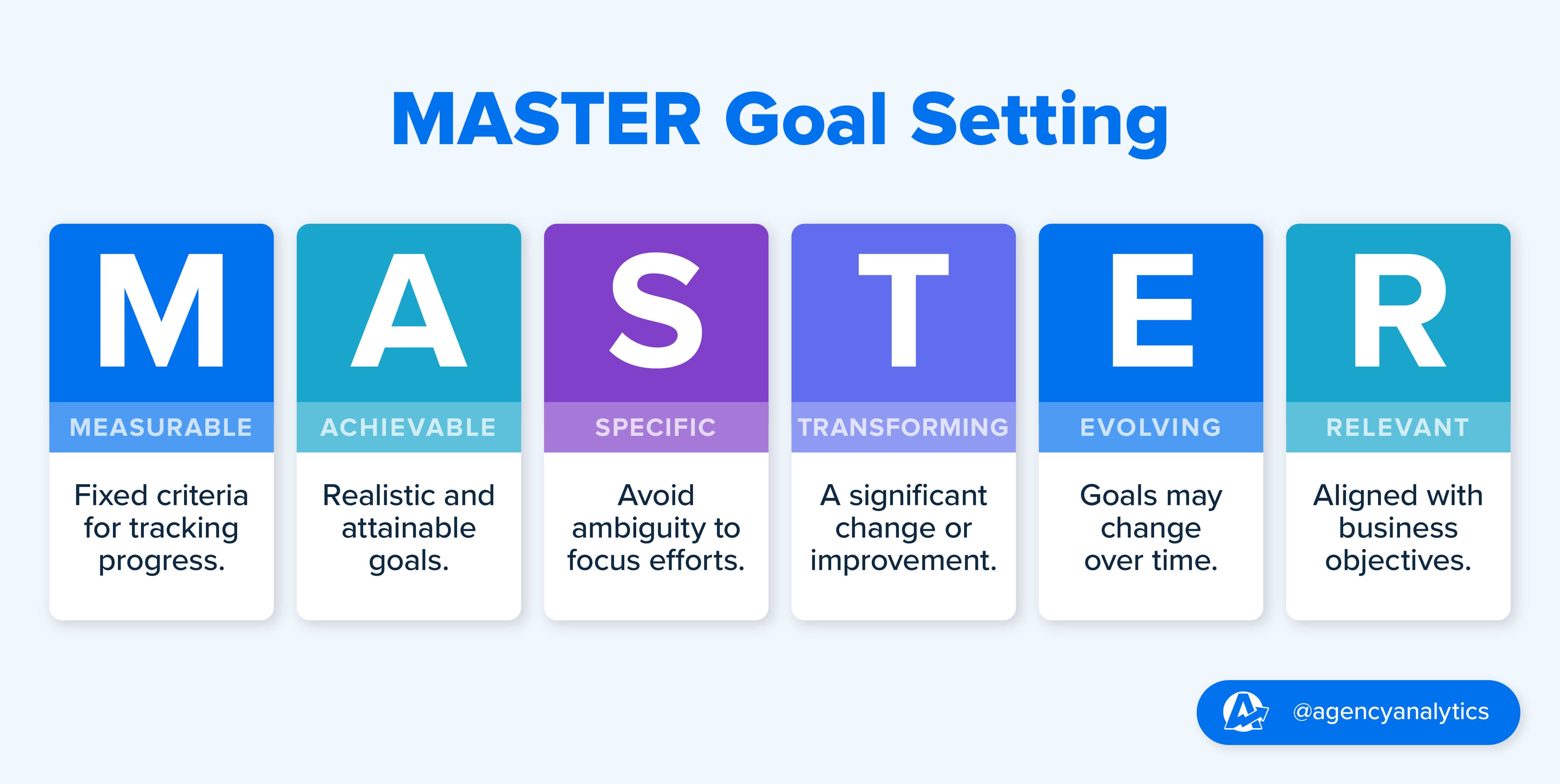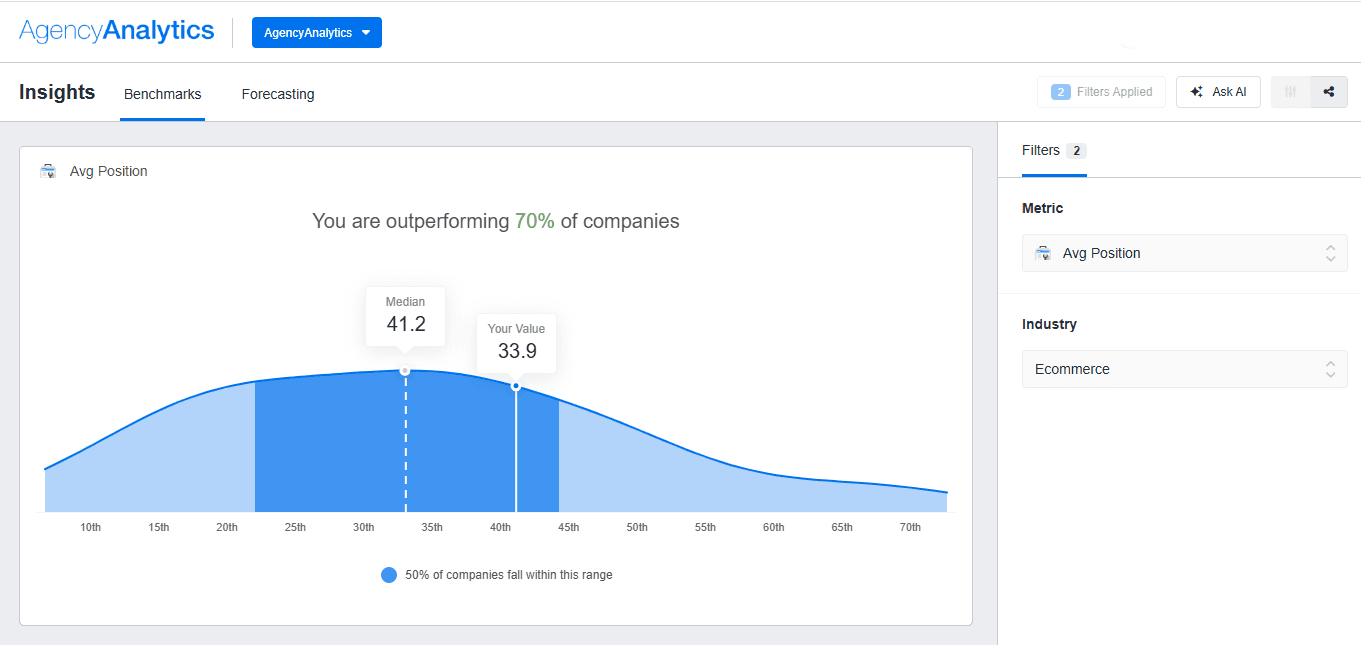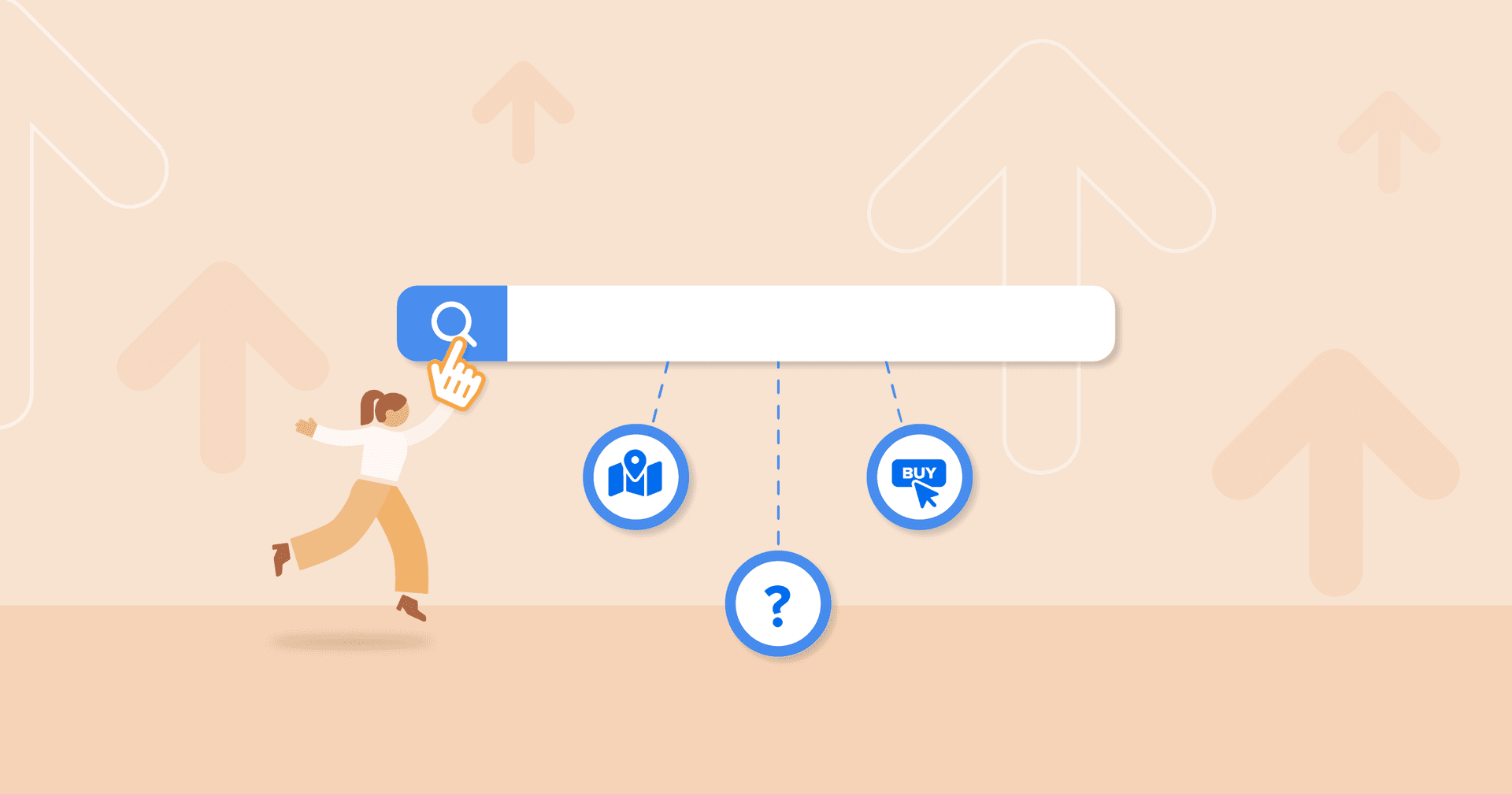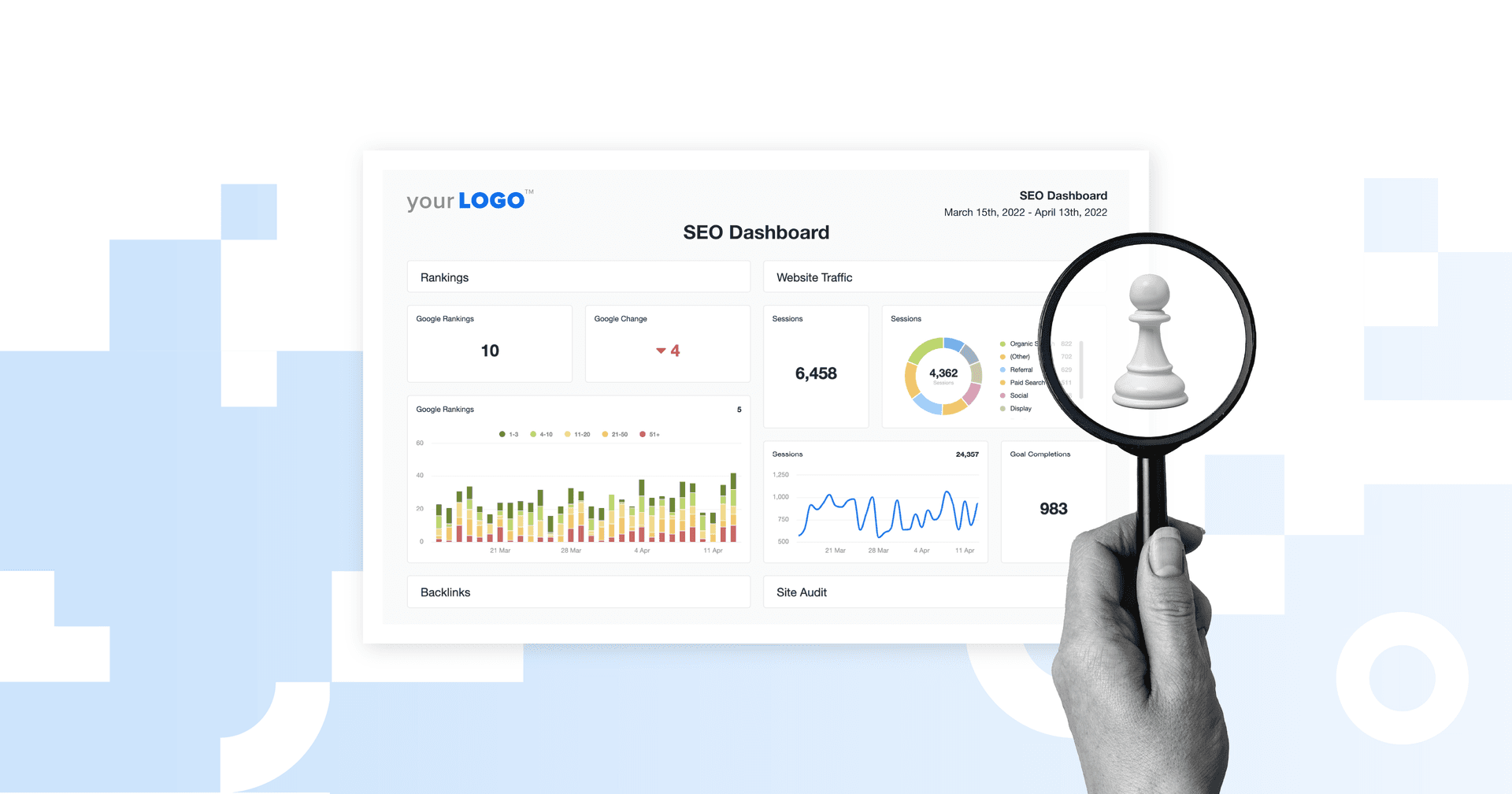Table of Contents
QUICK SUMMARY:
SEO goals are measurable objectives to enhance a website's search engine performance. They focus on increasing organic traffic, improving keyword rankings, and boosting conversion rates. This article discusses strategies for setting effective SEO goals, aligning them with client objectives, and creating custom client reports that reinforce the value of an agency's SEO strategies.
Most marketing agencies rely on search engine optimization (SEO) to play a role in client success. But top-performing agencies know how to set powerful SEO goals that drive big results and keep clients engaged and delighted month after month.
Setting effective SEO goals involves so much more than just identifying keywords and combing over numerical data. It’s about focusing on the metrics that matter, determining a future vision, and reporting on goal progress to clients in a way that demonstrates your agency’s hard work and expertise.
Keep reading to get the complete rundown on how top-performing agencies set—and achieve—ambitious yet attainable SEO goals.
What Are SEO Goals?
SEO goals are specific, measurable objectives that guide your efforts to improve a website's visibility and performance on search engine results pages (SERPs). These goals typically include targets to increase organic traffic, keyword rankings, and conversion rates. They serve as a roadmap to align your strategies and tactics with your client’s goals and objectives.
Why Do SEO Goals Matter?
In the broad scheme of things, SEO goals matter because without them, it’s hard to measure your success. Having defined objectives helps you—and your clients—know exactly what you’re working towards and helps you analyze your results down the line.
For marketing agencies specifically, here are a few key reasons why setting SEO objectives is super important:
Setting clear, realistic expectations with your clients
Guiding your strategy and avoiding a one-size-fits-all approach
Allocating appropriate time, resources, and expertise to your project
Avoiding ‘scope creep’ and projects growing beyond their initial plan
Contextualizing your end results with a clear point of reference
Proving the return on investment (ROI) of SEO efforts
Establishing a benchmark to work from in future campaigns
The more time I spend on SEO activities that move the needle, the more successful my clients and my business are.
Will Mullins, SEO Specialist, Will Mullins Search Engine Optimisation Services
How To Set Realistic SEO Goals for Your Clients
Having explored what SEO goals are and why they’re important to your agency, now it’s time to consider how you’ll set these goals. The SEO objectives you come up with for each client will vary based on a number of factors, including things like:
Client budget
Timeline
Industry and business model
Campaign scope
Funnel stage
You’ll need to take into account the client, the project, the time frame, and the allocated resources. From there, it’s helpful to subdivide your goals into different categories to further hone the SEO strategy and improve organic traffic.
Long-Term Goals and Short-Term Goals
When you’re setting SEO goals, think about both the long-term and the short-term. Perhaps your long-term goal is to get a website’s domain authority above 80—but if it’s currently sitting at 30, you’ll need a few short-term goals along the way.
The reason for setting both long and short-term goals and objectives is to make sure you have both a vision for the future, and attainable stepping stones to get there. Check out these SEO goal examples for inspiration:
Examples of Long-Term SEO Goals | Examples of Short-Term SEO Goals |
|---|---|
Improve overall internal linking across a website | Increase the number of backlinks leading to a specific page |
Improve conversion rates across all landing pages | Reduce a specific product page’s bounce rate from 50% to 45% |
Reduce the website’s bounce rate from 60% to 45% | Boost organic traffic from target keywords to an old blog post |
Increase revenue attributed to organic SEO traffic | Get a specific page into the featured snippets on the search engine results page |
Appear above competitors on search engine results pages for target keywords | Capture more leads coming from organic search traffic |
SEO Goals Based on Each Step of the Funnel
You’ve probably heard about BOFU, MOFU, and TOFU content—a.k.a, bottom-of-funnel, middle-of-funnel, and top-of-funnel content. Depending on the context of your client’s business, their prospects may be concentrated at different stages of the marketing funnel. So take that into account when deciding which user journey stages to target and set goals around. Here are a few examples to consider:
If your client is an industry leader in a broad-reaching business category, you may choose to focus on BOFU content. There’s likely a large potential customer base searching for high-intent queries like the name of the company, pricing information, and products or services they sell.
If your client is a well-known brand in a niche business category, focusing on MOFU content could be a good choice. More general queries around the product category and the solutions provided by those types of products would likely have a good search volume and be a good bet.
If your client is a startup, small business, and/or in a lesser-known business category, TOFU may be the best focus area. Potential leads may not know that the product category exists or even how to articulate their pain points. High-level queries around generally related topics will be a good starting place.
MASTER Your SEO Goals
Maybe you’ve heard of SMART goals. You know, goals that are Specific, Measurable, Achievable, Relevant, and Timebound? This is a great framework to work with, but we felt like it was missing some important context for current marketing tactics. Enter the MASTER goal-setting framework.
Here are the components:

Measurable: There’s a fixed criteria to measure success.
Achievable: The goal is realistic and attainable.
Specific: You’ve avoided ambiguity and the goal is clear.
Transforming: It leads to a significant change or improvement.
Evolving: The goal may change over time.
Relevant: It’s aligned with your business objectives.
Consider these factors when you’re setting your SEO goals. In particular, the transforming and evolving criteria are important to check in with. One of the main benefits of search engine optimization is that it’s a reliable tactic to improve the performance and structure of a website. But another major aspect of SEO is that the rules are always changing. As such, your goals should be changing alongside these shifts!
Use Industry Benchmarks for SEO Goal Setting
Incorporating industry benchmarks into your SEO goal-setting process brings clarity and context to client discussions. Benchmarks provide a solid foundation to set achievable targets while illustrating how your clients’ performance compares to similar businesses. Here are some practical ways to use benchmarks for setting realistic SEO goals:
Establish a Baseline Benchmarks like a Median Moz Domain Authority of 19 give a clear reference point for website authority. For clients with a Domain Authority of 12, an initial goal might be to reach the median, with strategies such as targeted link-building campaigns and content optimization.
Tailor Goals by Industry SEO goals vary widely by sector, making industry-specific benchmarks invaluable. For instance:
Attorneys and Legal Services: With a median of 44,094 monthly organic impressions (according to GSC), firms with fewer impressions can focus on improving high-performing pages and refining their keyword strategies.
Non-Profit Organizations: A median Semrush trust score of 27 offers a clear target to aim for when assessing the credibility and SEO performance of charitable websites.
A bounce rate of 46.03% for dental websites (from GA4) provides a standard for comparison. If a dental practice has a bounce rate of 60%, setting a goal to lower it through improved site navigation or better landing page content becomes a measurable priority.
Create a Roadmap for Growth Start by aiming for median or slightly above-median performance metrics. Once these goals are met, use additional benchmarks to push for incremental improvements, keeping clients motivated and engaged.
Build Confidence With Data Using benchmarks ensures goals are rooted in reality rather than guesswork. This helps build trust with clients, as they can see their goals are based on proven data rather than vague expectations.

Agency Tip: Benchmarks aren’t just for data points—they’re tools for storytelling. Frame each goal as part of a broader strategy tied to measurable outcomes. This approach keeps clients informed and ensures goals align with long-term growth.
What Influences the Success of SEO Goals?
Indeed, a number of factors can influence the success of your SEO work—and the outcome of your SEO goals. Some are within your control, and some are not. So what exactly influences the success of your SEO strategy? Here are a few factors to keep in mind:
The Quality of Your Content
Web crawlers look for valuable content that’s not just well-optimized, but relevant, well-researched, and recently updated.
Your Broader Keyword Strategy
You need to build topic clusters that use keywords effectively and accurately.
Technical Website Factors
The website’s technical factors like website performance, site security, page load speed, mobile optimization, and crawlability make a difference.
Backlinks and Linking Structure
The quality and quantity of inbound links, outbound links, and internal links as well as their anchor texts have a big impact.
When someone asks you to improve their domain authority, don't go out and build links from any blog that welcomes guest blog posts, as this will damage your client's SEO, even if it makes the vanity metric of increased domain authority look good.
Daniel Noakes, Founder, UClimb
On-Page Optimization
This includes things like keyword distribution, meta tags, headings, and content structure.
Local SEO
A site’s location-specific SEO can make a big difference, especially for businesses that rely on attracting local qualified leads.
Algorithm Updates
You need to stay up to date with the latest search engine algorithm changes and implement those learnings in your SEO work.
Competitive Content
It’s helpful to run a competitor analysis to understand what other content is out there that your client is up against.
How To Measure the Success of SEO Goals
Like with any kind of goal, it’s important to craft SEO goals you can track. You want to be able to measure progress and monitor performance in order to identify what’s working and what’s not, allowing you to make adjustments to the seo strategy as needed. Start by choosing the right SEO metrics to measure.
Choosing Key SEO Metrics
Selecting SEO metrics is often one of the trickiest things to do in the goal-setting process. You might be tempted to monitor a laundry list of metrics, but this isn’t the most effective strategy.
While running a deeper analysis can provide a lot of context, it’s important to narrow it down to only a handful of SEO key performance indicators (KPIs). Otherwise, you risk getting side-tracked—and more importantly, you risk not being able to effectively communicate the value of your work to your client.
It’s wise to be discerning when you’re choosing your SEO metrics. Which ones will most effectively represent the value you’re trying to create? Which ones are most closely linked with the output you’re trying to achieve? Consider these questions and select accordingly for your SEO tracking efforts. Here are some common SEO metrics to measure:
Click-Through Rate (CTR)
The percentage of users who click on a specific link or ad compared to the total number of users who saw it.
Conversion Rate
The percentage of website visitors who complete a desired action, such as making a purchase or filling out a form.
Bounce Rate
The percentage of users who visit a webpage but leave without interacting with the site or viewing additional pages.
Page Load Time
Page load time is the time it takes for a web page to fully load and become visible to a user.
Backlinks
Hyperlinks from external websites that point to a web page, influencing its authority and search engine ranking.
Domain Authority
A score that indicates a website's relative authority based on several factors including backlinks and content quality.
Page Authority
Page Authority is similar to Domain Authority, but focuses on the authority of a specific page on a website.
Mobile-Friendliness
How a web page appears and performs on mobile devices, including factors like responsive design and usability.
User Engagement Metrics (Time on Site, Pages Per Session)
These metrics are good indicators of the quality of content on a website, and how engaging it is.
Indexation Status
Indicates whether search engines have crawled and included a webpage in their index, making it searchable.
ROI (Return on Investment)
The profitability of an SEO campaign, calculated by comparing the generated revenue against the associated costs.
How To Measure and Report on SEO Performance
With the above KPIs and metrics in mind, you might be wondering: how do you track your SEO performance and share it with your clients? Between Google Analytics, Search Console, and an array of third-party tools available, it can be tricky to figure out the best way to monitor your SEO metrics. But it’s important that you do, because this knowledge allows you to report on the success of your agency’s SEO efforts.
Sharing your SEO metrics data shouldn’t just be something that happens at the end of your work, or 3 months out from your go-live. Creating consistent and ongoing transparency is essential to building your clients’ trust in your agency.
Share your progress with clients at a regular cadence so they can see those upward trends in real-time. And if anything isn’t going according to plan, you’ll be able to be up-front with them about why that is—and what you plan to do about it.
AgencyAnalytics offers reports that are simple to understand. A client with zero SEO knowledge can still see how the work we have done has helped benefit their website. Clients can also have their own access to reporting which means they can see how they are ranking at any time.
Guy Hudson, Founder, Bespoke Marketing Plans
Creating SEO Reports With AgencyAnalytics
Building clear, comprehensive SEO reports with data visuals that show the impact of your SEO efforts is essential to proving the value of your team’s work. A solid SEO report provides a quick and accessible assessment of how you’ve delivered a return on your client’s investment.
AgencyAnalytics helps agencies with everything from rank tracking and backlinks, to running competitor analyses and creating white labeled SEO reports that clients understand. Users have access to data from 80 marketing platforms in one intuitive and user-friendly interface, where you can dig deeper using both ready-made seo dashboards or custom build a bespoke social media reporting dashboard. This is a great opportunity to incorporate site audit results and any other campaign metrics that closely tie into their SEO strategies.
The custom metrics and goals feature allows agencies to set targets and track progress against them, sharing that information with both internal team members and clients via user access permissions.
Creating a comprehensive SEO report is quick and easy with the SEO template. Featuring metrics like search engine rankings, tasks completed, and project goals and KPIs, AgencyAnalytics allows you to create reports that tell a story. Use data visualizations to illustrate where your client started, and the upward journey that has taken place as a result of your agency’s efforts.
Setting SEO Goals Sets Your Agency up for SEO Success
Your ultimate goal is to craft high-performing marketing strategies and campaigns for your clients. And one of the most important tools in your toolkit is effective goal setting. Coming up with SEO goals that are at once ambitious, attainable, and relevant to the client’s business objectives is essential to earning their trust—and delivering a return on their investment.
Curious to see what AgencyAnalytics can do for your SEO goals? Give it a try today with our 14-day free trial.

Written by
Kyra Evans is the Manager of Content Marketing at AgencyAnalytics. She has over 15 years of experience writing content for SaaS, tech, and finance brands. Her work has been featured by HuffPost and CBC, and she serves an engaged social media readership of over 30,000 community members.
Read more posts by Kyra EvansSee how 7,000+ marketing agencies help clients win
Free 14-day trial. No credit card required.





